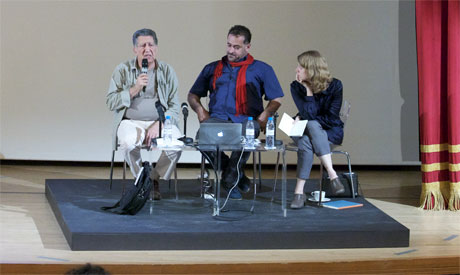
March Meeting 2015, Day 2, The State of the State – Presentations by Fawwaz Traboulsi and Khaled Hourani, moderated by Anneka Lenssen (Photo: Dina Kabil)
As part of this year's Sharjah Biennial, between 11 and 16 May, the Sharjah Art Foundation (SAF) held its annual meeting called March Meeting.
Launched in 2008, the March Meeting has gained an international reputation, particularly in artistic and academic circles. This year, the meeting adopted the same theme as the Sharjah Biennial 12: "The past, the present, the possible."
By integrating the socio-political context, the five days of discussions pointed to the many "red lines" which exist in the overlapping spheres of art and politics.
"Art cannot be de-politicised. Art uncovers life," said the Palestinian artist, curator and art critic Khaled Hourani, during the final discussion held on 16 May.
The concepts of nationalism and the state dominated large parts of the discussions, with questions being asked about how to re-define both.
With some borders being erased inside Europe, they are only being reinforced from the side facing the Mediterranean where immigrants are arriving from Libya and Tunisia.
At the same time, the voices of Scottish and Catalan nationalists started to become louder, asking for a redefinition of the boundaries of some European states. Similar questions were addressed in context of the Middle East-- with failing states such as Iraq and Syria-- and the post-revolutionary countries which have now returned to having despotic leaders.
The debate was accompanied by a screening of Letters to Max, a 2014 film directed by French-American artist Eric Baudelaire.
This highly controversial movie reflects on Abkhazia, a small nation in the Caucasus that has clear borders and a government, though doesn't exist legally, as it is not recognised by other states.
Through the correspondences between Eric Baudelaire and former diplomat Max Gnvijia, the film sheds light on a state which "exists without really existing," as the director puts it.
It was especially after the fall of the Soviet Union that Abkhazia fought for its independence. The film brings images from the bloody war in the early 1990s, during which the Georgians lost the right to return home.
The situation of Georgians of Abkhazian origin-- those excluded from their own country-- is parallel to the status of Palestinians, who have no right of return to their land that is now occupied.
The reformulation of the idea of the state has attracted the attention of Hourani, for whom having his own state to call home is a dream.
"As artists, we are forced to choose between bad and worse… Probably, the idea of the state is bad, but what is worse is its absence," he explained.
However, the Lebanese historian and social scientist, Fawwaz Traboulsi, criticised the film, objecting that for arts sake, many important facts about the nature of the conflict between Abkhazians and Georgians were omitted.
"By listening to the voice of Max only, the former diplomat who wants to continue his career, we tend to formulate the anti-nationalist and anti-state concepts," he argued.
Opposing the arguments presented, especially by the young artists from the post-revolutionary Arab world, Traboulsi kept underlining that one needs to exercise caution not to confuse between the totalitarian regime or the oligarchy and the state that has a democratic or confederate structure.
Short link: